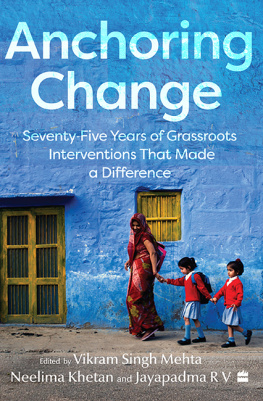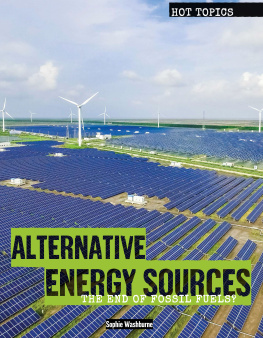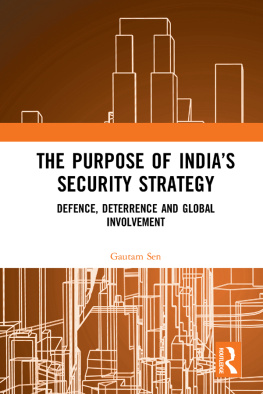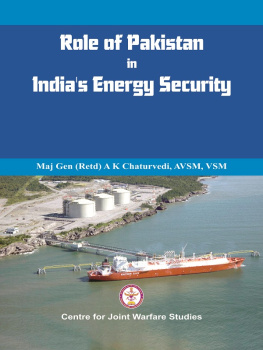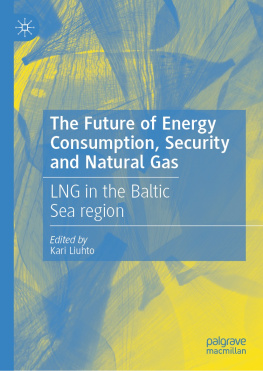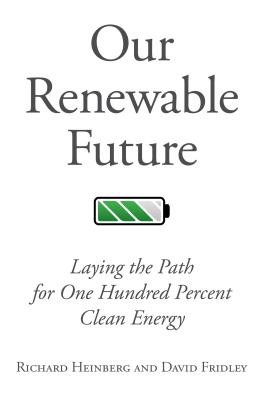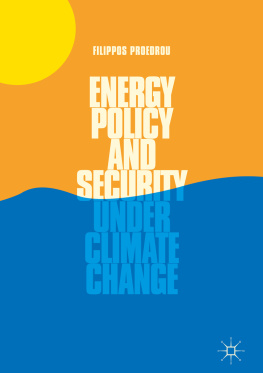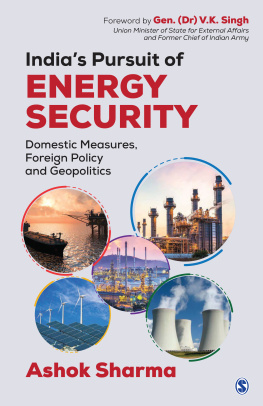Table of Contents
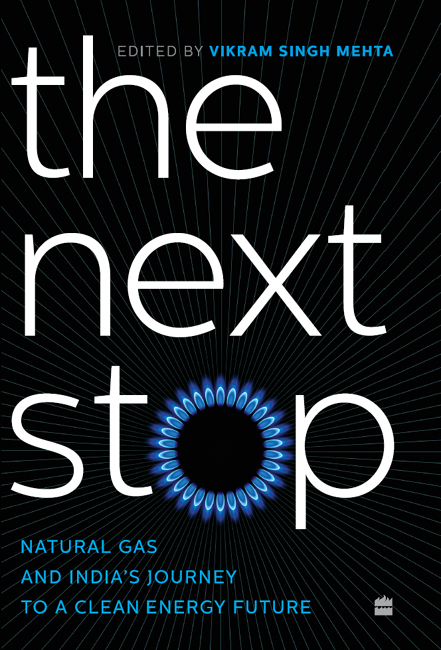

To Tasneem, Malika and Ahilya
CONTENTS
VIJAY KELKAR
VIKRAM SINGH MEHTA
GURPREET CHUGH
JEAN BAPTISTE DUBREUIL, AKOS LOSZ
MIKE FULWOOD, TIM BOERSMA
MIKE FULWOOD, TIM BOERSMA
AKSHAYA KOSHY MASON
SAMANTHA GROSS, DAVID VICTOR
ANITA ODEDRA, MARTIN J. HOUSTON
MARTIN HOUSTON, RENEE PIRRONG
IAN CRONSHAW
TALMIZ AHMAD
MOHIT BHARGAVA, KISHORE KUMAR HOTA
RAHUL TONGIA
ASHU SINGHAL, RAJEEV MATHUR
ASHOK GULATI, PRITHA BANERJEE
AMIT MEHTA
GAUTHAM BABU DASARI, SARAH KHOO
RAJEEV KUMAR
ASHU SINGHAL, RAJEEV MATHUR
PRABHAT SINGH
ANUPAMA SEN
NEETU VINAYEK, SANTOSH SONAR, HITEN SUTAR
SUDHA MAHALINGAM
ROBERT VAN DER GEEST, SIMON STOLP, FRANK VAN OORDT, MICHAEL STANLEY
AJAY MATHUR, SOUVIK BHATTACHARJYA, KARAN MANGOTRA, NITIN BAJPAI
VIJAY KELKAR
Chairman, India Development Foundation and Vice President, Pune International Centre
VIKRAM SINGH MEHTA IS ONE of Indias leading, and avant-garde, thinkers on energy and environment policies as well as on governance reforms. I warmly congratulate him for bringing together this outstanding panel of experts and scholars to compile this comprehensive volume on gas and the gas sector, which spans global and national dimensions. This is indeed most timely.
I have been associated with issues related to the hydrocarbons sector since the 1980s and this association intensified in the second half of the 1990s. I have always held, and continue to believe, that natural gas has a positive and pre-eminent role to play now and in the future. The necessity of nurturing this peace-building fuel in our region, and its importance for the energy security of India as well as for broader foreign policy concerns, cannot be overstated.
The contours and evolution of the sector globally, and in India, makes for a tale of two distinct citiesone, where the natural gas sector has flourished and occupies a natural space as a responsible bridge fuel until renewables take centre stage; and the other, where the presence of inconsistent and incomplete policy miasma and market signals have hampered the growth of the gas-based economy. Indias tale is clearly the latter, wherein gas today represents a mere 67 per cent of total energy consumption vis--vis the global average of almost 25 per cent and Indias own stated ambitions of 2325 per cent. Unfortunately, there has been little groundswell to establish the primacy of the followinggas as a key fuel for the economy; the necessity to augment domestic production; and even less, the necessity to create conditions further downstream to allow the sector to blossom.
More than a decade ago, while delivering the inaugural Rajiv Gandhi Lecture at the Rajiv Gandhi Institute of Petroleum Technology, I had pointed out that a key lacuna of Indias policy approach to gas emerged from a resource shortage mindset. The consequent policy choices preferred to adopt administrative allocation and under-pricing, which only accentuated the shortage phenomenon, thus landing India in a perennially short position. It needs to be emphasized, even more energetically if necessary, that our world is indeed blessed with an abundant supply of this blue gold.
Indeed, there is a clamouring need for national debate and, more importantly, a resolution regarding the role of the greater supply gas resources in the development of the nationits role in the economic, social and security spheres. Such a debate will set the tone for developing a more cogent hydrocarbon policy. A cogent policy will go a long way in establishing and aligning and creating comfort in the different constituencies around the economic rent and larger developmental benefits associated with responsible exploitation of our natural resources. I always felt that one of the key themes in the decades ahead would be to complete the transition of the energy base from non-commercial energy to commercial energy. This is a task that is still incomplete.
In India, two policy areas need the most immediate attention to encourage the efficient use of our national resources. These are the creation of a stable fiscal and contractual framework in keeping with the risk and reward paradigm, and the creation of a market-driven pricing mechanism. Attention to these two areas will ensure intergenerational equity and a fair and transparent regulatory regime supported by administrative structures that will evoke confidence among all stakeholders in the policy ecosystem.
The wonderful collection of essays presented in this book encourages me to share some reflections on how to re-energize and foment the growth of the gas sector in India.
First, we must clearly and definitively move to a production-sharing contractual system to replace the current revenue-sharing regime. This is especially urgent given the concerns around materiality and risk associated with most of Indias hydrocarbon basins. This is a sine qua non if the sector is to be unfettered and upstreamed, to bring in the much-needed risk capital and expertise to efficiently and effectively explore and develop our hydrocarbon basins, especially for gas. This is the base stack of aspiring for energy security.
Second, one needs to dismantle any and all administered pricing controls on prices for domestic natural gas and bring it in line with import opportunity costs.
Third, it is critical to unbundle the transportation and marketing of the key incumbent (GAIL) in the natural gas sector, create a rules-based natural transportation monopoly with an infrastructure class risk profile and allow the consumers to benefit from a liberalized marketing environment.
Fourth, it is important to ensure the viability of gas-based power through policy reform in the electricity markets through market-based pricing innovations such as time-of-day pricing, non-linear pricing, etc. This will allow markets to absorb the more flexible gas-based power.
Fifth, unleash the power of gas-based micro-grids that are both efficient and responsible from the broader perspective of the climate agenda and simultaneously strengthen the decentralized systems.
Finally, I would also like to resuscitate the discussion on the creation of a sub-sea corridor that connects key gas-producing nations in the Gulf region with India, one of the largest gas markets of the future. In our region, fraught as it is with security risks, this mode will bring much-required symmetric interdependence and contribute significantly to national energy security and regional stability.
The current global contextof a supply glut in the liquefied natural gas (LNG) market and softening demand, with concomitant softening of prices and increased liquidityagainst the backdrop of the accelerating juggernaut of renewables, presents a new slot for gas resurgence if provided with the right tailwinds. Given Indias promises as part of the Paris Accord, providing these tailwinds is both an economic and a moral imperative.
It is in this context that this book is both timely and pivotal. Vikram Singh Mehta and all the contributors have made a seminal intervention in the debate and discourse on the making of Indias policy related to gas, by bringing together a veritable compendium of the whos who of the gas sector, globally and in India. This volume puts together the encyclopaedic anthology of everything you wanted to know about gas but were afraid to ask. I am sure this book will lead our policymakers to make the blue gold achieve our golden goals of greater global peace and prosperity.


